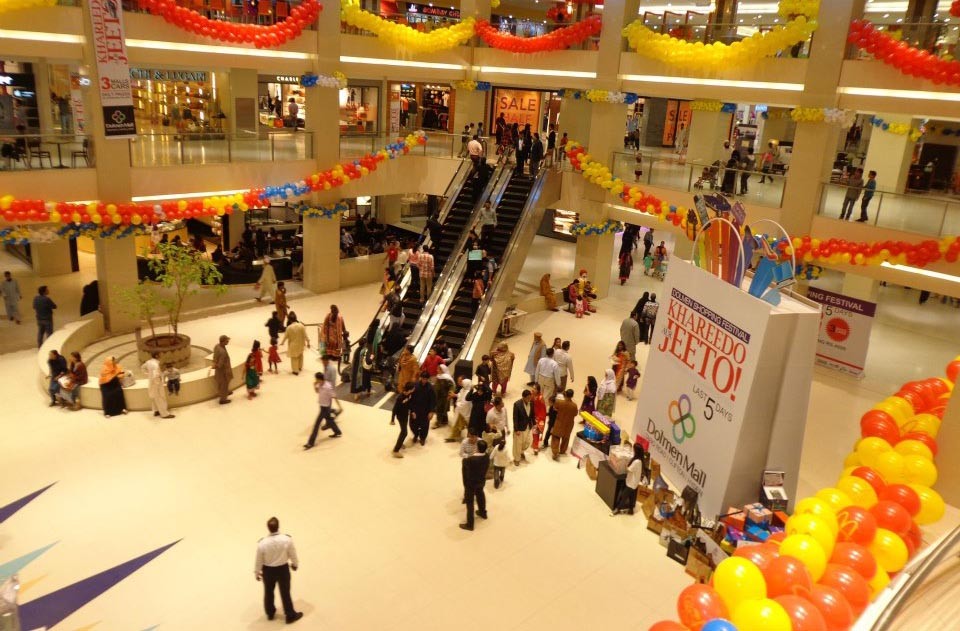
For women leading hurried and over-worked urban lives, malls are perhaps more of sanctuaries than merely a collection of shops

The roads leading to malls are choked with activity and traffic. Dolmen, Packages, Centaurus -- these are household names and second home to Pakistani urban families.
When experts look at the demographics of those who frequent malls in Pakistani cities, the number of women is much larger than men, an easy double figure apparent even to the common observer. Mall culture has definitely arrived with a bang in Pakistan, and women are the reason why malls are the hub of hustle and bustle.
For people like Mehek Masood, it is simply more convenient to go to a mall as one can find all the brands under one roof. "Malls give us a totally different shopping experience. Not only are they facilitating us in the form of parking but food courts are also a big reason."
For young working women like her, shopping at a mall is preferable "because I can just hop from one shop to another. Whereas if I visit Zamzama or any other place, not only is it difficult to find parking in all that clutter, but I also feel that I am somehow rushing my buying decision," says Masood who calls shopping at a mall a "recreational activity".
Most women would agree that a mall is more than just shopping -- it serves as a public space for families and friends in a country where safe and comfortable places are simply not enough. Malls also happen to be air-conditioned, and women, along with children, throng to malls for the comfort of lowered temperatures when mercury rises.
For Rushna Shamsi, a mother of four, it is the place of preference when she thinks of an outing with her children. It’s safer, more convenient, and provides one stop shopping. As a mother of young children it is an ideal choice. "My teenage boy enjoys the food court. My pre-teen girl loves shops with accessories. The toddler fits herself at the play area for kids. I love the food, the shopping, the ambience -- all of it. But with kids it does get heavy on the pocket if visits are frequent," she says, adding that for her the fact that malls provide a hygienic public space is also a factor that ropes her in.
Read also: Viable or not
However, looking at it from the perspective of the entrepreneurs and retailers that have shops in malls, women coming to malls might form the largest body of visitors, but are not the most serious buyers.
Ayesha Mansoor, the driving force behind popular brands for women’s clothing -- Mausummery and Origins -- says that women go to malls for the overall entertainment experience. "They are not serious shoppers. The visitors to shops in malls that come in are usually there for an outing or an eating spree. Malls are becoming popular as entertainment spots. Eating, grocery or even just window shopping are the main attractions," she says, adding that retail sales are not doing well in malls due to high overheads. When asked why all brands still have shops in malls, her answer is simple: "to have brand presence".
Not all women are fans of the trending mall culture. One such woman is Beena Imran. "In my opinion, with the busy lives that we lead nowadays, going to a mall is nothing but a waste of time unless you have nothing better to do. If I know what I want, and have jotted it down, I’d rather go to an individual shop than going through the hassle of reaching a mall, spending a good 15-20 minutes in reaching my desired shop and mostly not getting what I went for in the first place," she says.
Yet, even women like her who are not big on malls acknowledge the reasons why malls are becoming popular. "They provide a recreational place for people from all walks of life. Some of them just go to the mall to sit and kill time. It may be a source of happiness for them and could help them forget their worries or problems in a lively atmosphere."
For women leading hurried and over-worked urban lives, then, malls are perhaps more of sanctuaries than merely a collection of shops.